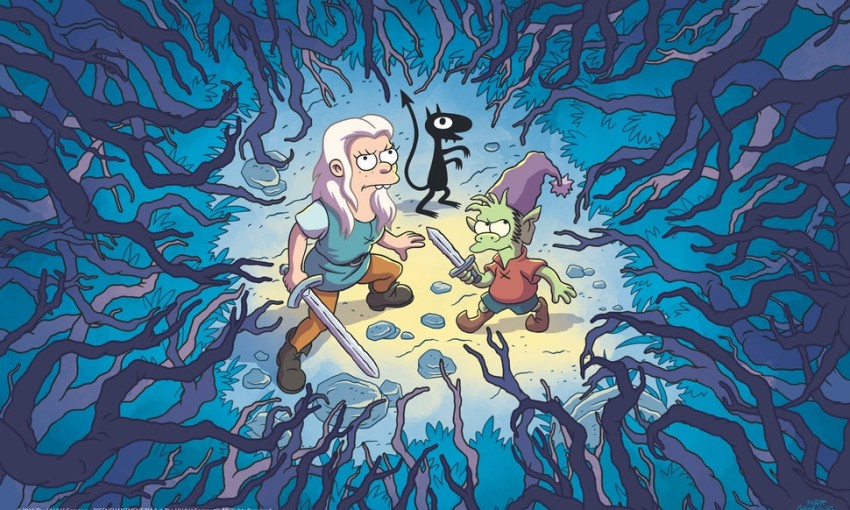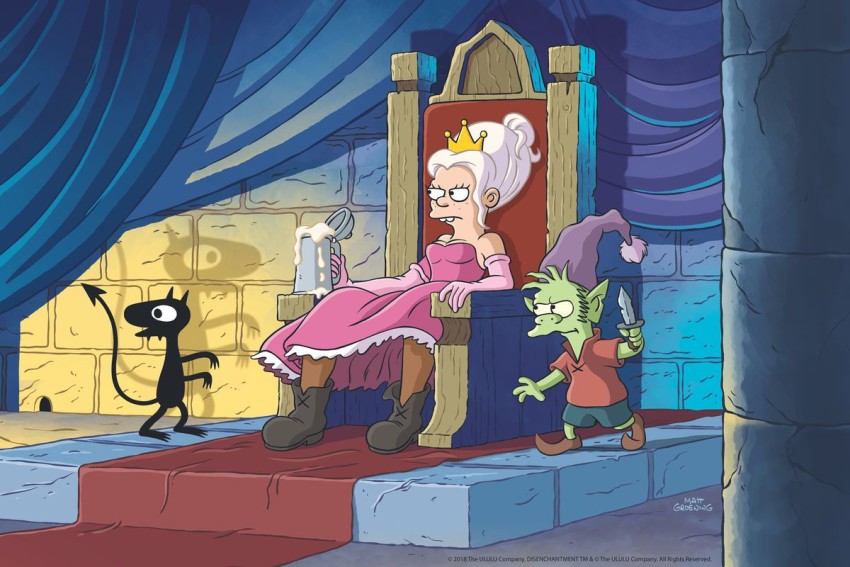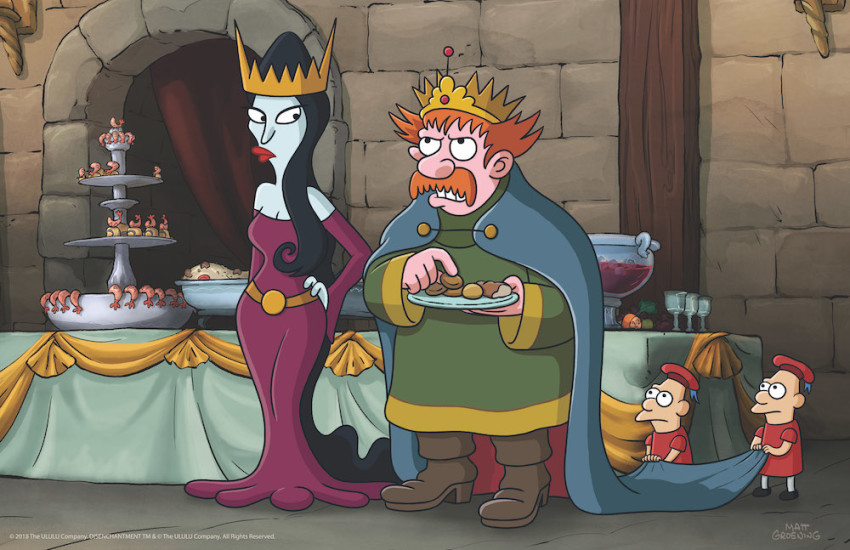Disenchantment
August 24, 2018 · 0 comments
By Andrew Osmond.
 The first thing to stress is that Disenchantment, now streaming on Netflix, gets better. This is a terrible advert for a TV series, of course, though anime fans may be readier than most viewers to give animated shows time to improve. After a first part that feels naff and derivative – and a huge misstep from Matt Groening, creator of Futurama and The Simpsons – Disenchantment quickly starts gelling and connecting. No, it may never achieve the greatness of the previous shows at their peak, but it’s a perfectly likable corner of the Groening-verse.
The first thing to stress is that Disenchantment, now streaming on Netflix, gets better. This is a terrible advert for a TV series, of course, though anime fans may be readier than most viewers to give animated shows time to improve. After a first part that feels naff and derivative – and a huge misstep from Matt Groening, creator of Futurama and The Simpsons – Disenchantment quickly starts gelling and connecting. No, it may never achieve the greatness of the previous shows at their peak, but it’s a perfectly likable corner of the Groening-verse.
Despite its “fantasy” tag, Disenchantment doesn’t feel like an epic franchise, but rather a tidily limited story that may end well without outstaying its welcome (insert free kick at The Simpsons). That’s another thing to stress – this first batch of ten episodes released to Netflix ends on a seemingly world-changing cliffhanger. Netflix has already ordered ten more episodes, their release date unconfirmed, but already the show feels more arc-led than any previous Groening. It’s possible that a “final” ending was pre-planned from the start – like many anime, of course.
Disenchantment is a paradoxical title for a cartoon in 2018, even a cartoon clearly skewed to older viewers. At first glance, the name suggests subversive intent, a show to undermine “enchanting” fantasy. But it can’t really mean that. Spoof fantasies have been around in the mainstream too long to be subversive any more. Today’s youngsters cut their teeth on Shrek; their elders saw Monty Python and the Holy Grail. When Peter Jackson brought out his first Lord of the Rings in 2001, that film felt subversive, daring to take such stuff seriously.
No, Disenchantment is a pretty meaningless name in itself, but so were The Simpsons and Futurama. The show’s USP is that it brings Groening’s comic sensibility to the fantasy genre, ever if the show’s world could be Shrek mashed up with Python’s Grail.
From Python, we get the wallowing in medieval grot. The show’s mostly set in the coastal kingdom of Dreamland, which looks pretty enough in long shot, with a castle on a cliff and the town sloping down like a stony wedding dress. But here be plague pits, drug dens, child labour, torture dungeons and public beheadings, though some viewers may find Disenchantment coy on other details, like medieval sanitation. The quasi-Python comedy film Jabberwocky positively revelled in piss and shit.
 But as always in a Groening show, the background is far less important than the characters and their outlook. As usual, they’re cynical, sassy and anti-establishment, though their jerkishness is mostly reined in more than it was with Groening’s past characters. The lead is Bean, a teen wild-child princess who’s a hard drinker, keen gambler and boy chaser (the boys run away when they realise her royal status). Bean has a royal name, but it’s too long to remember.
But as always in a Groening show, the background is far less important than the characters and their outlook. As usual, they’re cynical, sassy and anti-establishment, though their jerkishness is mostly reined in more than it was with Groening’s past characters. The lead is Bean, a teen wild-child princess who’s a hard drinker, keen gambler and boy chaser (the boys run away when they realise her royal status). Bean has a royal name, but it’s too long to remember.
She’s forever at loggerheads with her anything-but-majestic dad, who’s stumpy and grumpy, looking like a mossy rock with his red hair and moustache. Called Zøg, the monarch’s voiced by John DiMaggio, Bender in Futurama. Bean’s and Zøg’s strained relationship isn’t helped by her mother being deceased and replaced by a royal stepmum, Queen Oona. She’s not clearly wicked – we can’t rely on fairy tale rules here – but she’s intimidating; hailing from a swamp kingdom, she sports gills, a fly-catching tongue and a vampiric accent. She’s played by the multi-voiced Tress MacNeille, who also voices Oona’s cute son Derek.
But these relatives are less important in the show than Bean’s non-human friends. Elfo’s species is obvious from his name. He opted to leave his faerie realm after being driven mad by its tweeness. (The elves hanged him from a gumdrop tree, but he was too light.) Elfo wanders into Dreamland’s castle in the middle of Bean’s forced wedding, and causes uproar, as elf blood is said to grant immortality. Consequently Elfo often ends up the subject of painful exsanguinations, though he sees a lot of the girl he’s falling for – Bean.
The demon Luci has no such romantic concerns. A wedding gift for Bean, he speaks like a streetwise big brother, looks like a silhouette with a pot-belly, and is somehow assumed by most characters to be a cat. (Anime fans might be faintly reminded of the Disney-dubbed Jiji in Kiki’s Delivery Service, who was sarkily voiced by Simpsons actor Phil Hartman.) Luci functions as an anti-Jiminy Cricket, constantly egging Bean into bad choices, usually with alcohol. His deeper purpose is an ongoing mystery, although we occasionally cut to his mystery masters, magically spying on events from an unknown location.
The first episode gives the impression that the series may be all about Bean, Elfo and Luci on the run from Dreamland, embarking on a medieval road movie. In fact, the bulk of the show – at least the first ten episodes – follow the characters’ turbulent lives in Dreamland, though with side-trips. A visual highlight is a journey to the lush and buzzing swamp kingdom of Queen Ooma. There’s also a full-blown “quest” episode, though it doesn’t do Tolkien jokes (for Groening-style Tolkien, see this Simpsons couch gag).
Perhaps the first episode feels so weak simply because it takes so long to set up Disenchantment’s characters and relationships. Even it has some good gags, like Elfo surviving a de-bowelled giant falling on him (a la Buster Keaton) and a routine with puritanical farmers who get maddened by praise. The episode also establishes that Disenchantment is more risqué than primetime Simpsons when it needs to be; wait for the Tinker Bell character. Later on, there’s a joke about walruses (!) which might be a middle finger to everyone who complained about a certain panda scene in The Simpsons.
 By the time we reach the walruses, the show’s gelling nicely, with a good rapport between Ben, Elfo and Luci, and the support cast establishing themselves (an unflappable castle herald is the quickest hit). The show’s chemistry is closer to Futurama than the Simpsons. The start-up youngsters Bean and Elfo are fumbling through early adulthood, while Luci replaces Futurama’s Bender as their bad influence. Even one of the supporting characters, Bean’s boorishly boastful suitor Prince Merkimer, feels similar to the Kirk-spoofing Zapp Brannigan in Futurama.
By the time we reach the walruses, the show’s gelling nicely, with a good rapport between Ben, Elfo and Luci, and the support cast establishing themselves (an unflappable castle herald is the quickest hit). The show’s chemistry is closer to Futurama than the Simpsons. The start-up youngsters Bean and Elfo are fumbling through early adulthood, while Luci replaces Futurama’s Bender as their bad influence. Even one of the supporting characters, Bean’s boorishly boastful suitor Prince Merkimer, feels similar to the Kirk-spoofing Zapp Brannigan in Futurama.
Disenchantment’s early antics can feel purposeless – there’s a grave-robbing scene that’s just too mean – but the stories soon become satisfying, with twists, good punchlines, and room left for random noodling. One episode brings us the world’s most terrible spa attendant, another has some quiet gay character shipping. The depiction of Dreamland’s mounted police force is a joke worthy of Chuck Jones, and Comic Book Guys will appreciate a few meta-gags in the script (“I just feel some more clearly set out rules about what can and cannot happen would help urgh!”) The Odyssey gets spoofed in one episode, Indiana Jones in another, and a cannibal fairy-tale in a third.
A perfectly good little show, Disenchantment might be crushed by the high expectations of Groening devotees. But it may find appreciation from other fandoms; for example, lovers of the comic fantasy books by Pratchett or Holt (Holt’s sensibility is perhaps closer). Anime fans may like the show, though it’s no closer to anime than Futurama or The Simpsons were, except for its more integrated story.
We’ll say it again, though. Disenchantment’s big stumble is that dratted first episode…
Andrew Osmond is the author of 100 Animated Feature Films.
Leave a Reply